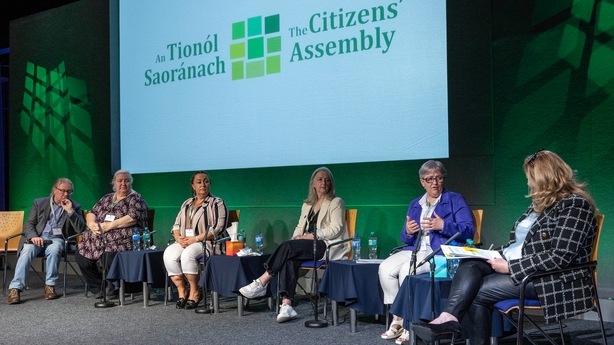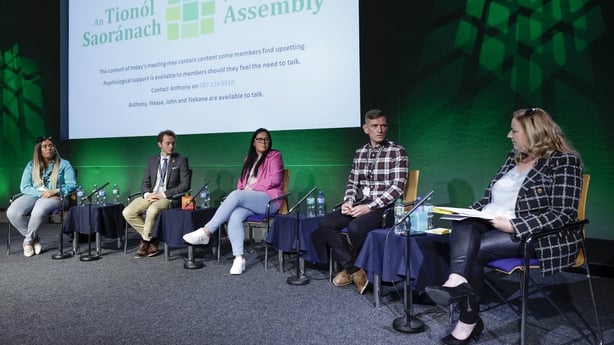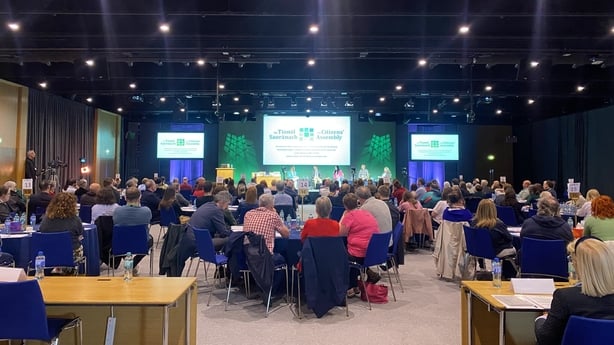A mother has told the Citizens' Assembly on Drugs Use that she was forced to buy methadone off the street because her child could not access treatment services.
The assembly has been hearing about the experience of individuals who have experienced substance abuse.
The second meeting of the Assembly, which began last month, is taking place at Dublin Castle.
Aileen Malone said her daughter - who is now in a treatment programme - was turned away from five methadone clinics due to a pre-existing mental illness.
"I paid for her methadone by buying it off the street so she could access it, now that's ridiculous," she said.
The assembly heard that Ms Malone's older daughter died by suicide. She said Dara started using recreational drugs in her early 20s, which spiralled into a 12-year addiction, including heroin, which resulted in her death a number of years ago.
"There was a whole gang of them that did it, but she was the only one that developed problems with it," she explained.

A panel of family members outlined their experiences around the problem use of drugs by relatives.
Maureen Penrose’s daughter also had an addiction to heroin.
Ms Penrose had to take guardianship of her grandchildren under the Kinship Care Programme.
However, she said families taking in their grandchildren do not get financial assistance.
"I would have had them for six months the first time, the youngest child was just three months old."
She said the children were deeply in love with their mother and were upset to be separated from her - seeing her once a week at a rehabilitation centre.
Annmarie Sweeney explained the impact of her addiction on her family, who she said simply did not know how to cope.
"From moment I picked up a drug it spiralled and my family was affected," she said.
Ms Sweeney, who is a member of the Traveller community, said the shame around her addiction was double because it was from both inside and outside the community.
She was not aware of any other Traveller with a drug addiction at the time.
Ms Sweeney explained that she went to prison a couple of times and told Assembly members that she "had nothing" following the last sentence.

Her children had been taken and her family was no longer in contact with her.
However, she is now working to break the silence of drug addiction in the Traveller community, by offering peer support, which her family did not have, she said.
"I’m sitting here clean, I have my family back in my life," she told the assembly.
Gearaidh Mathews’ said the effect of having a child who suffered with addiction resulted in him spiralling downwards because he had very little control over what happened.
It revolved around caring for his son, looking out for him and ensuring he was okay.
"Had it not been for the support of the family addiction support network, I would not be a sane person today. It really destroyed me," he said.
Mr Mathews explained that he needed help, compassion and support in a non-judgmental way from people who had been through the same thing.
"It was difficult to find in the HSE at that time, there were certain members of medical staff that had no sympathy at the time," he said.
"But also, there were and are people in the HSE that are compassionate and caring and within the structures of the HSE they did their best to support but it wasn’t enough," he said.
Ms Penrose said that having a family member addicted to drugs was like walking on eggshells all the time.
"You’re in a constant state of emergency," she said.
"You’re afraid of saying the wrong thing in case they go out and take drugs.
"Everything is guided towards them getting better."
The focus of families of children who are in danger led the panellists to highlight that impact on siblings and other family members.
Ms Penrose relayed a story where one of the teenagers said: "You have to be on fe***n’ heroin in this house to get any notice."
She said "a beautiful thing happened" when people started meeting each other in groups once a week to talk about their loved ones.
She added that there was a national framework for this initiative, which closed down two years ago.
"We’d like to bring that back again; it brings you to a situation where you’re not afraid to talk about it anymore," she said.
Catriona Kirwan explained how the lack of wraparound services for people who leave prison result in relapses.
She told the assembly that while her son was in prison, he was clean and sober, but once he left prison "it all started again".
Ms Kirwan said there is a lack of understanding and compassion in the system for the service user and family members.
Cathy Kelleher of the Health Research Board said there were 13,744 referrals by families of loved ones into drug treatment services between 2010 and 2020.
Three in four were females, mainly aged between 35 and 54 years.
One in 20 referrals were children, half were aged under 15 years.
Many panellists throughout the day expressed concern over the difficulty in accessing treatment services.
Stop 'sweeping drug use under carpet'

Gillian O'Donnell, whose parents used drugs, was born addicted to heroin and had a substance abuse disorder by the age of 11.
She was in hospital for the first three months of her life before going home to her parents who were based in Dublin's inner city, where there was a heroin epidemic.
Younger children got involved with drugs and accustomed to drugs very early life.
"It was, you know, part of the infrastructure I suppose," she said.
Ms O'Donnell said it was "part and parcel" of the environment and the area she lived in.
She had to "face the consequences" of her addiction when she got a criminal record that she said has followed her through their life.
While she acknowledged that people have to face consequences, she pointed out that she went to court for something minor but was imprisoned for four months which led her to lose her home and her children being taken into care.
When she left Mountjoy four months later, she ended up in emergency accommodation and became homeless, which resulted in an escalation in her drugs use, including crack cocaine.
"I was traumatised being an emergency accommodation. I was traumatized at the news of my children," she explained.
She said society discriminates and retraumatises people who are in drug addiction.
"It's dis-enabling rather than enabling...there's no compassion," she said.
Karl Ducque grew up in the inner city with hard working parents. He started "acting up" in school and getting into trouble.
Being told he was a "bold kid" resulted in him believing it, he said and he started using solvent thinners when he was around 11 years old.
"I was in full flight from reality," he said.
It gradually built up to stronger drugs, harder drugs, and a deeper dependency.
His mother brought him to a GP at 16 years of age and he was put on a six-week methadone programme which he ended up lasting for 18-years.
He lost many friends through drug addiction.
Mr Ducque said he had to take responsibility for his addiction and to stop blaming others and went through the 12-step programme.
Me Ducque, who is now a youth worker, received a round of applause when he told the assembly that he is proud of his story and that he's helping people.
Shannon Connors, who is a member of the Traveller community, pointed out that being labelled from a young age means being labelled for life.
Ms Connors pointed out that her key worker had been in addiction in the past which enabled her to relate to him.
She told the assembly that she views herself as "one of the lucky ones" for getting into Coolmine Treatment Centre.
Asked what needed to be done to break the cycle of drug use, she said people had to stop "sweeping it under the carpet".
She said people on either end of society (higher and lower income earners) are using drugs, yet she said those in poverty get greater sentences.
Fionn Connolly-Sexton talked about drug use in third level.
He explained how his brother took his own life, which led Fionn to become anti-drugs.
However, a number of years later, he started to use drugs due to traumas of the past.
He pointed out that students used to have "a couple of drinks" and a joint, but now he they can go out and just do cocaine, MDMA and ecstasy without drinking, "bouncing from one club to another" over the course of a night.
Mr Connolly-Sexton also made the point that the closure of services in rural communities means people are are feeling trapped.
"Why would you not take drugs because you feel trapped," he said.
As well as hearing from people impacted by drugs, the assembly will have presentations from frontline workers, families whose relatives have been affected by substance use, and the experiences of communities.







